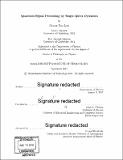Quantum signal processing by single-qubit dynamics
Author(s)
Low, Guang Hao
DownloadFull printable version (10.17Mb)
Other Contributors
Massachusetts Institute of Technology. Department of Physics.
Advisor
Isaac L. Chuang.
Terms of use
Metadata
Show full item recordAbstract
Quantum computation is the most powerful realizable model of computation, and is uniquely positioned to solve specialized problems intractable to classical computers. This quantum advantage arises from directly exploiting the strangeness of quantum mechanics that is fundamental to reality. As such, one expects our understanding of quantum processes in physical systems to be indispensable to the design and execution of quantum algorithms. We present quantum signal processing, which exploits the dynamics of simple quantum systems to perform non-trivial computations. Such systems applied as computational modules in larger quantum algorithms, offer a natural physical alternative to standard tasks such as the calculation of elementary functions with integer arithmetic. The quantum advantage of this approach, based on simple physics, is of significant practical relevance. In cases, arbitrary bits of precision may be emulated using only constant space. Moreover, the simplicity and performance of quantum signal processing is such that it is the final missing ingredient for realizing a number of optimal quantum algorithms, particularly in Hamiltonian simulation. Quantum signal processing realizes a useful fusion of analog and digital models of quantum computation. At the physical level, we focus on how even a simple two-level system - the qubit, computes through optimal discrete-time quantum control. Whereas quantum control is typically used to synthesize unitary quantum gates, we solve the synthesis problem of unitary quantum functions with a fully characterization of achievable functions, and efficient techniques for their implementation. This furnishes a surprisingly rich framework in the analog model of quantum computation for computing functions. The generality of this model is realized by many applications, often with no modification, to quantum algorithms designed for digital quantum computers, in particular for matrix manipulation. In this manner, we solve a number of open problem related to optimal amplitude amplification algorithms, optimally computing on matrices with a quantum computer, and the simulation of physical systems.
Description
Thesis: Ph. D., Massachusetts Institute of Technology, Department of Physics, 2017. Cataloged from PDF version of thesis. Includes bibliographical references (pages 117-125).
Date issued
2017Department
Massachusetts Institute of Technology. Department of PhysicsPublisher
Massachusetts Institute of Technology
Keywords
Physics.